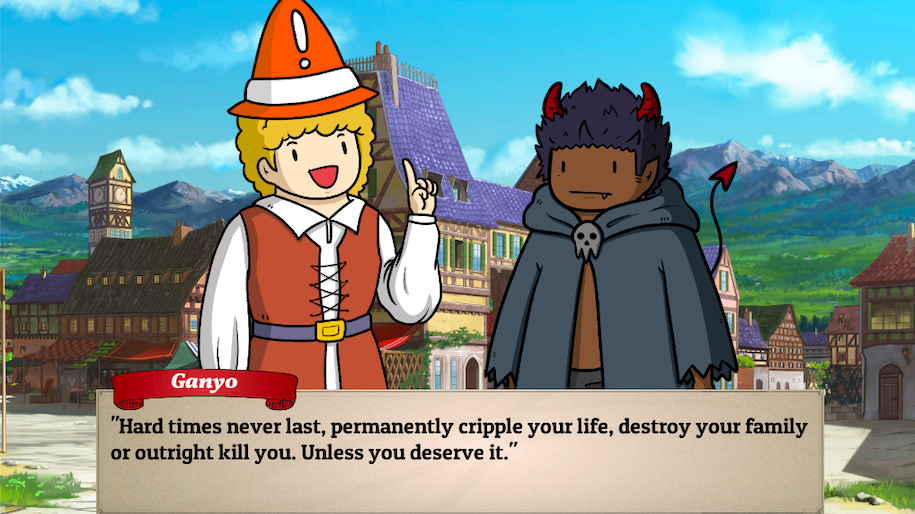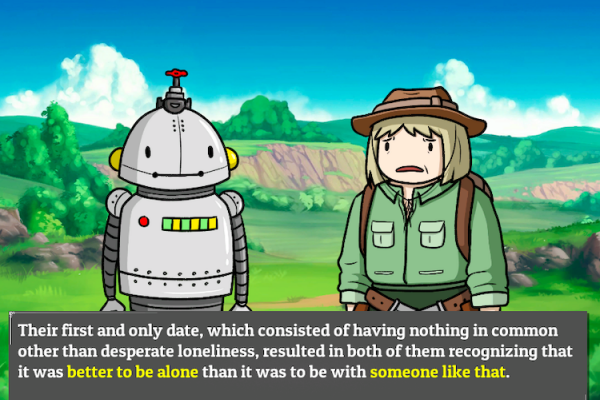There’s no lack of laughs in Guildmaster Story. Canadian indie developer Will O’Neill has been able to find a niche within gaming by creating titles with dark, realistic stories that focus on social commentary. 2014’s Actual Sunlight tackled a variety of taboo subjects including depression and the corporate grind that often attributes to that, while Little Red Lie was one of 2017’s most interesting titles due to its deep examination of financial independence and social class. His past titles had some humorous moments, but they were mostly depressing plays that left players contemplating issues in their actual lives. O’Neill’s latest Steam release, Guildmaster Story, is much more upbeat in tone but packs just as much punch in its social critique.
The reason for this shift in tone is rooted in the current political climate. “Personally, I feel like much of what is happening now is out of our hands,” O’Neill told Mandatory. “The most you can do is laugh at it, and maybe try to find the beauty in how unavoidably human all of it was.”
Guildmaster Story revolves around Ganyo, a wannabe entrepreneur from a wealthy family, that winds up destroying the business that was passed on to him by his late father. He’s essentially what Chapo Trap House would call a “failson,” as he lacks any sort of redeemable skills and has never faced any sort of hardship. For many, this would be a wake-up call, and a reason to reexamine how he had skated through life and never took responsibility for his actions. Instead, he continues to fail upwards and winds up becoming a guildmaster. It’s here where he builds a business empire even greater than the one he started off with by simply having the poor work for him on the promise that he’d dish out experience points to them. It’s a plan that mirrors a lot of scams and even legitimate, yet scummy, businesses that focus on paying in exposure rather than money.
Despite traditionally being an issue for artists, O’Neill believes that the expanding freelance and gig economy are forcing many to face economic instability even by working blue-collar jobs. “Those kinds of pursuits are now encompassing even the lives of people who probably want nothing more than to get paid a decent wage and enjoy their life,” explained O’Neill. “I think that matters, because so much of what you do hear about economic instability — especially among younger people — centers around glamorous industries in a way that I think is engineered to make them seem foolish; as if they’re getting what they deserve for pursuing these industries.
“It may be true that your aspiring Twitch streamer falls into that category, but so does the person who delivers your food, washes your clothes and drives you around. They don’t want to be ‘heroes’ necessarily — they just have nothing else to take a shot at, either.”
Cover Photo: Will O’Neill
Laugh it up: Funny Gaming Memes of the Week
Party on: Top 7 Video Games to Fire Up Your College Dorm Party
Follow Mandatory on Facebook, Twitter, and Instagram.
Indie Puzzle Creator Goes Hard on Wealth Inequality Commentary, Adds a Dash of Humor
-
Smartphones obliterate empathy.

Ganyo is able to build a dominant empire off of the work of others and as the protagonist of a game, he’s shockingly passive. In fact, when faced with any sort of decision or crisis, the self-proclaimed leader tends to pull out his phone and play a mobile game until it either goes away or gets resolved by someone else. This is how the game, which is mostly comprised of visual novel-type cutscenes, presents players with its block-matching puzzles.
Not only does this wind up tying the narrative and gameplay together, but it speaks to O’Neill’s disdain of smartphones. “I don't think smartphones get enough credit for how they empower the obliteration of empathy for things that are literally happening around you, and in a way that will be enormously relevant as society continues to stratify economically and beyond. I hope I was able to use the smartphone to show how Ganyo isn't merely dumb and lazy, but how it augments his willful ignorance on top of it.”
Plenty of games revolve around a power fantasy that focuses on the player gaining more strength and money. Rather than romanticize that, Guildmaster Story deals with the dark side of wealth inequality and what happens after a character has already achieved all of that.
“Even when you do see games that deal with these darker realities, they usually close on a note of hope, or at least with a view on something better that might have happened,” said O’Neill. “It would be ridiculous for me to say that I don't understand why that is appealing. Anyone can understand what makes that appealing, especially as things in reality get harder and harder. But this is also why I don't think these power fantasies make people selfish: I think, after the initial high, they actually make them sad. Then they get angry. And then they get selfish.”
Photo: WZOGI
-
‘Guildmaster Story’ highlights the obliviousness of those born rich.

A lot of the humor in Guildmaster Story comes from the manipulative and extremely selfish Ganyo. While he shares a lot of qualities with other characters that O’Neill has written in the past, he’s ultimately made unique by his utter ineptitude. Rather than deciding to use others to become rich in a repulsive plan, Ganyo is simply living life like he always has and expects things to be handed to him merely because that’s how society has always worked for him.
“The tough (and fun!) part was writing him as simultaneously stupid while also being fairly articulate, albeit with frequent errors of overconfidence,” O’Neill said. “I definitely wanted to portray him as someone who was a lot less actively malicious than [Little Red Lie deuteragonist] Arthur Fox, who was also extremely driven by drug and alcohol addiction.
“What I wanted to portray with him mostly, though, was the obliviousness of the born rich. Comic book movies paint the ultra-wealthy as actively portraying the demise of everybody else, but more often than not they are just completely cordoned off from the rest of the world. Once a year, a guy will come to them and tell them they got 2.2 percent richer, and they just shrug and go back to playing croquet. The pain and damage contained in that 2.2 percent is monstrous, but they have no perception of it. At times, Ganyo catches some faint glimmer of that, but his whole life quickly buries it.”
Photo: WZOGI
-
Social media and the gig economy receive constant criticism.

Beyond wealth inequality and the power that the rich hold over the poor, Guildmaster Story regularly throws jabs at both social media and the gig economy that has quickly changed how the world operates.
“All of this stuff that was supposed to help everyone has turned out to mostly help an extremely small number of people,” opined O’Neill. “They can have their macroeconomic defenses of a generally rising tide, but the distribution of who has overwhelmingly benefited is pretty clear.”
The writer also believes that the “virtually inescapable” social media is impacting how multiple generations live. “It has empowered demagoguery, made all of us deeply insecure, consolidated even more influence into the hands of those who already had it, and I doubt we have even begun to see how much it will screw up the people who have truly grown up with it. Anyone who claims it is good is invariably selling something. Usually themselves.”
Photo: WZOGI
-
O’Neill wants to create games that are different than triple-A titles.

However, like most people that hate social media, O’Neill is also a reluctant user of it. On his Twitter account, he regularly discusses the new releases that he winds up playing, and he’s become a frequent critic of the writing see in triple-A releases from a narrative standpoint.
“This is only my suspicion, but I imagine that it all comes down to what you can live with,” answered O’Neill when asked about why game narratives are so poor throughout the industry. “You might not be able to get away with failing to promise that the narrative will be fantastic — it's clearly important to the marketers in terms of shaping the hype for a major release — but you can definitely get away without it actually being any good, original or even structurally sound.
“Examples would be needlessly cruel, but I think it would be hard for anyone to deny that this is what happens more often than not: Suspense is built at E3 and the like, intriguing trailers follow for years on end, and then the finished product tells a story that offers an astonishingly shallow contemplation of the thing that was interesting about it, revealing the marketing to have been a complete misdirection. Sometimes it barely even makes sense, though more often than not you've seen so many things exactly like it that you can mentally sketch in what was obviously cut.
“And at this point, honestly, it feels like participating in that marketing process to even discuss or weigh this kind of thing out. In doing so, you give credence to the idea that narrative in AAA games is some kind of going concern, when pretty much everything is pointing towards a future of glorified slot machinery. Hopefully the pendulum will swing back.”
Despite all of his issues with the medium, O’Neill has a great reason for continuing to create games. “[It’s] the knowledge that what I'm doing is genuinely not like what other people are doing, and that I'm giving an honest voice to things that people find difficult to talk about,” he explained. “If I didn't feel that way, I think I would quit."
Photo: WZOGI









